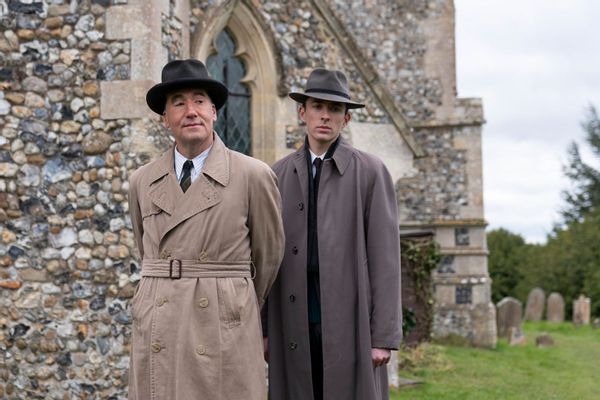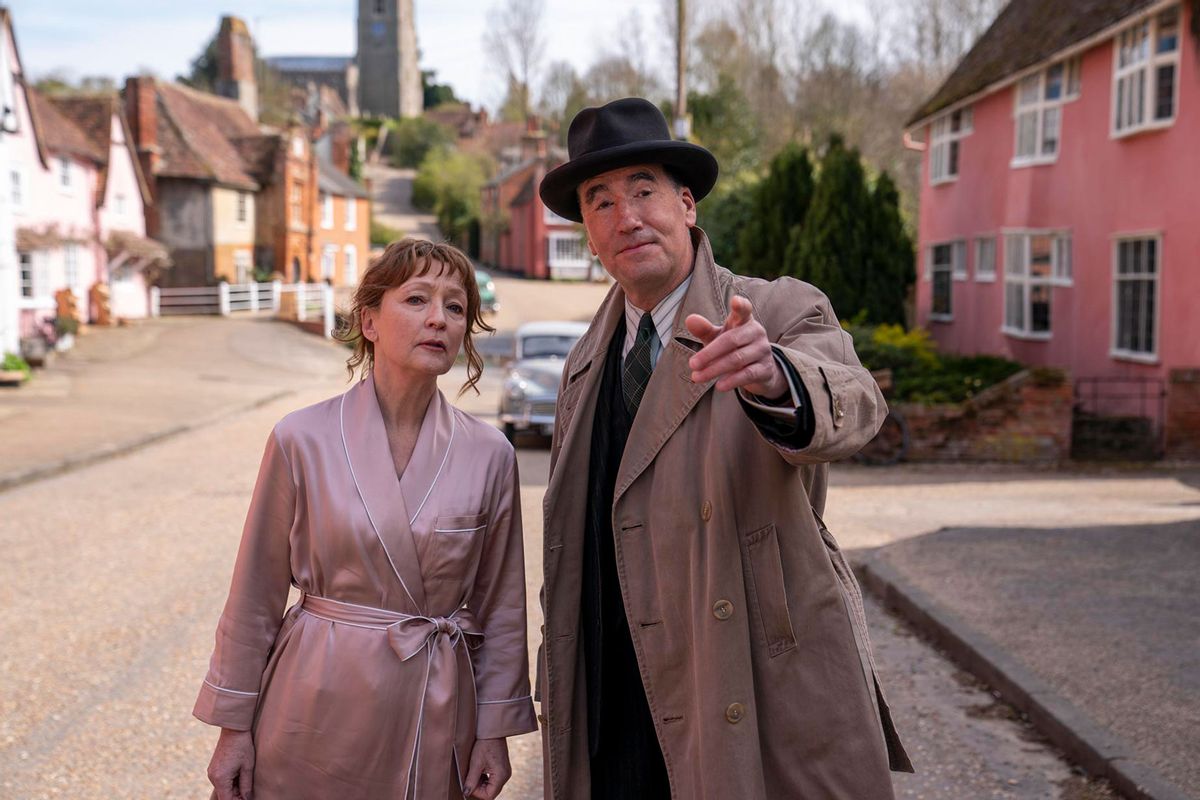"Who did it? You're in the story – you must know!"
In the latest episode of PBS' "Magpie Murders," book editor Susan Ryeland (Lesley Manville) is demanding the name of the killer in the murder mystery she's editing. Unfortunately, she can't just flip to the last chapter because it's missing. But who needs that when she can just ask the book's fictional detective directly?
Too bad Atticus Pünd (Tim McMullan) hasn't exactly been cooperative, delivering cryptic remarks – like "betrayal hurts" – that sound portentous while offering no actual clues.
"He's been in German labor camp during the war and then he comes to England as a refugee."
Whether it's stress or too much gin, Susan can see and hear the fictional detective as if he had somehow stepped out from the pages of the recently dead author Alan Conway's book. Initially, Susan was startled when she had caught sight of the sleuth in the rearview mirror of her sporty convertible. But over time, she seems to have accepted that she can talk to and pick the brain of this figment of Alan's imagination.
"The development of that relationship was very interesting," McMullan told Salon in a Zoom interview about playing Atticus Pünd. "What was important to try and find was the development of trust and growing interdependence between the two characters. They need each other. In the beginning when she first sees him, she's pretty freaked out by it, to put it mildly. And then by the end, she's really quite pleased to see him."
In the tradition of Agatha Christie's Belgian detective Hercule Poirot, German refugee Atticus Pünd brings a unique outsider flavor to the very English mystery set in the 1950s. As Susan reads her book, onscreen we see how Atticus gets pulled into investigating two deaths that may or may not be related. The detective seems unflappable, perhaps influenced by his past.
"He's been in German labor camp during the war and then he comes to England as a refugee and sets up as a private detective in the style of Poirot and other private detectives that we know," said McMullan. "I think he's a little bit troubled. He's wounded by his experiences, haunted by his experiences, but he's very dignified.
"He's a gentle soul, but who has this tenacity to get to the truth of things," he continued. "I felt that when when he gets to the point of working out who did it – which of course is a great achievement and an intellectual satisfaction for him – it is almost more in sorrow and pity than in anger. He has an empathy for human frailty. And of course, it's human frailty that that gives rise to the mistakes that people make which lead them to commit crimes. So he's not vindictive."
While Poirot is rather dapper, sporting a three-piece suit, pocket watch, silver-topped cane and signature mustache, Pünd is less glamorous. Landing on just the right appearance for him took a few trials, one of which McMullan suggested and was ultimately rejected.
"I wanted glasses, which the director squashed," said the actor. "He said you can't film people in glasses. I don't know if that's true or not, but he was very anti that."
Instead Anthony Horowitz, who had adapted "Magpie Murders" from his own novel, and the director had their own ideas. "Both he and the director didn't want to create a visual persona that could be directly compared in any way to any other TV fictional period detective," said McMullan. "So we decided to keep it very simple. And we felt that the silver-topped cane was again, a little bit too much of a cliche of that kind of genre writing."
"I think he really enjoys being able to come out of his novel and explain to one of his readers ... how they can solve a crime in their world."
They eventually landed on a trench coat, which American audiences may find familiar, identify it with Peter Falk's "Columbo" and other American gumshoes. The coat, however, has a far different significance when it comes to Pünd and his journey.
"The trench coat was a little bit shabby, and so I liked it. There's a kind of slight air of refugee about him," said McMullan. "The coat is Eastern middle European design; looks like from the beautiful old photographs from the '40s. When people are stuck in transit, they wear those kinds of coats with a belt that does up in the middle and two rows of buttons and stuff. Then the homburg hat was a classic German Austrian hat. The hat gives the character a good silhouette."
 Tim McMullan as Atticus Pünd and Matthew Beard as James Fraser in "Magpie Murders" (PBS/Eleventh Hour Films)
Tim McMullan as Atticus Pünd and Matthew Beard as James Fraser in "Magpie Murders" (PBS/Eleventh Hour Films)
Pünd of course needs a sidekick, who we find in assistant James Fraser (Matthew Beard). While James is a good-looking, good-natured young man, he's rather lost when it comes to fathoming the way Pünd can unravel mysteries. McMullan enjoyed creating their fun dynamic.
"I think we found it very quickly," he said. "I think that James is always trying to cheat, to please Pünd, to get things right, but he never quite does. So Pünd gets a little bit exasperated with him and is always having to remind him what to do and pointing out his mistakes. It's with a bit of exasperation, but also with a great deal of affection."
When interacting with James, Pünd stays strictly in character – that is, he's the 1950s detective he appears to be. When he speaks to Susan in the real world, however, he conveys an extra level of cognizance, acknowledging his book reality as well as her own.
"Pünd is a character in the kind of novel where things happen in a particular way, and we know how they happen because the genre that he exists in has particular conventions," said McMullan. "One of the conventions is that the detective will always work out who did it. He says to Susan, 'Yes, within the conventions, I will solve the crime. This is an immutable fact.'
"At the same time, he has the awareness that he is in a novel and he's able to talk to someone who lives in real life, and point out the difference between the way things are in his world and the way things are in our world. So there's a wonderful collision between the two of them in which they find actually, that maybe things aren't so different. . . . And so I think he really enjoys being able to come out of his novel and explain to one of his readers and help talk to them about how they can solve a crime in their world. And she learns from him certain things about that and about herself. Anthony would call it a sort of meta-suspense."
Want a daily wrap-up of all the news and commentary Salon has to offer? Subscribe to our morning newsletter, Crash Course.
Soon, viewers will be able to catch McMullan in another project that's also a riff of of classic detective fiction, the "Enola Holmes" sequel following the adventures of Sherlock Holmes' indomitable teen sister.
"I've done a few bits and pieces since 'Magpie Murders,'" said McMullan. "Netflix did a film last year came out last year called 'Enola Holmes.' I'm a rather nasty character in the second, which is great. And I think that comes out quite soon, sometime in the autumn. And I'm about to shoot a remake of the action movie 'Red Sonya.' They're doing a remake of that."
"Magpie Murders" airs Sundays at 9 p.m. on PBS.
Read more
about "Masterpiece"

Shares